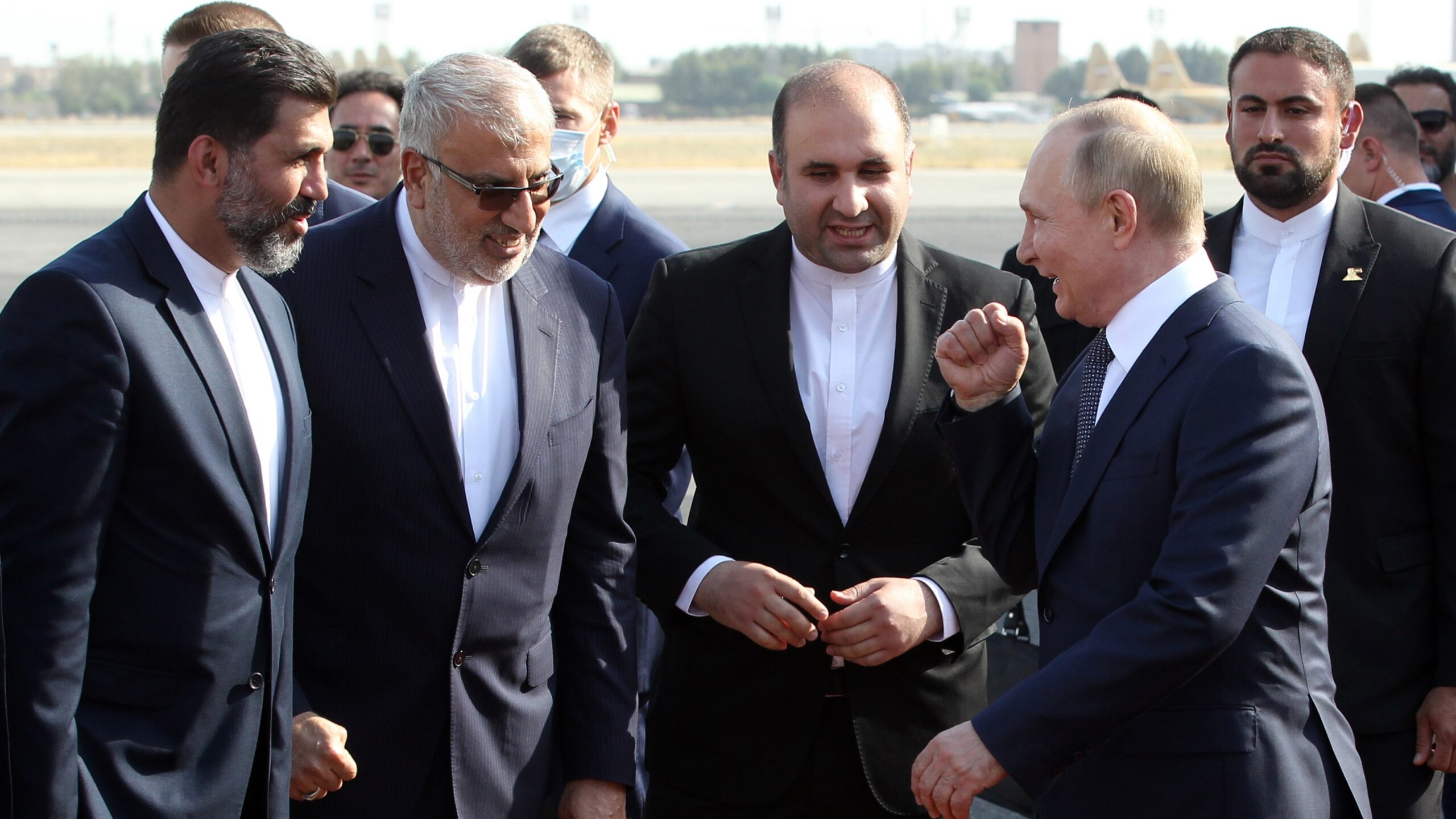
Russian President Vladimir Putin (R) gestures as Iranian Minister of Petroleum Javad Owji (2ndL) looks on during the welcoming ceremony at the airport on July 19, 2022 in Tehran, Iran. (Getty Images)
TEL AVIV: When a shipment of Iranian-made missiles, transiting through Syria, were struck in Aug. 14, it seemed like just another routine and officially uncredited strike by Israel against weapons heading to Hezbollah in Lebanon. But the location raised eyebrows: just outside the Russian-controlled port in Tartus.
The strikes, according to Israeli military sources, hit roughly three kilometers from the Tartus base, a leased military installation of the Russian Navy located on the Mediterranean sea. Russia was given roughly five minutes warning via a deconfliction line before the strikes, launched from both sea and from planes in Lebanese air space, hit the target; the strikes resulted in the deaths of three Syrian soldiers, per media reports, but no Russian casualties.
Per the Israeli sources, that’s the closest a strike has come to the Russian base — and it’s hard to ignore the message such a close attack sends, at a moment when Iran and Russia are growing ties that have Israeli officials concerned about future cooperation.
In recent weeks, Iran and the Russia have increasingly found common ground, with officials from both nations expressing a willingness to deepen their political and economic ties. Israeli officials have been mum on the record about the new cooperation, but the strike, members of the defense community here privately say, seems crafted to send a message that Iran cannot count on Russia to protect its assets in Syria moving forward.
The first sign of growing relations between Moscow and Tehran came when the White House stated that Tehran is getting ready to provide Russia with weaponized drones for use in Ukraine. Days later, Russian President Vladimir Putin visited Tehran, one of the few countries around the world willing to welcome the Russian leader since his decision to invade Ukraine in February.
The Israeli military assess that first deliveries of those Iranian drones could come in September, sources say, with Russians currently in Iran to begin training on their use.
RELATED: After Russia’s purported request for Iranian drones, Israel frets over Syria strikes
Increased trade with Russia could help Iran’s economy, which has suffered for years from US banking and oil sanctions, despite growing political isolation. On the other hand, Russia sees Iran as a potential source of technology it can no longer easily import due to sanctions; Iran brings trade routes, knowledge of how to circumvent sanctions, and oil export experience.
Of course, Moscow also brings something to Tehran. Notably, on Aug. 9, an Iranian spy satellite dubbed Khayyam was launched by a Russian launcher from the Baikonur cosmodrome in Kazakhstan.
Getting such a system into space has been a long-sought goal for Tehran, which has led to a number of high-profile launch failures. According to a report in the Iran International website, Tehran plans to eventually put three more versions of the Khayyam satellite into orbit. It is believed the systems are Russian made, despite claims from Tehran that they are domestic designs.
Another sign of the enhanced cooperation, as reported by a number of Israeli outlets over the last week, is a dramatic increase in the number of cargo flights between Iran and Russia seen since April of this year. Per those reports, at least 42 flights of Iranian airlines known to be operated by the Revolutionary Guard have landed in Moscow, compared to only three in the whole of 2021.
In an Aug. 4 analysis, Ksenia Svetlova of the Atlantic Council noted that the two sides are natural partners.
“Today, with Russia’s economy strained and its access to markets is limited due to Western sanctions, deepening cooperation between Moscow and Tehran appears inevitable,” Svetlova wrote. “For Iran, it might be the perfect chance to acquire Russian-made weapons, like the SU-30 fighter jets, that were previously unavailable due to the Kremlin’s concerns about Western sanctions against Iran. The Iranian shopping list is long, and Israel fears that there are no levers or sources of pressure to stop this deal in the current environment.”
Israeli defense sources agree that Moscow sees in Iran a potential customer for some of its main combat platforms — notable, given Monday’s statement from Putin that, per the AP, “We are ready to offer our allies and partners the most advanced types of weapons: from firearms, armor and artillery to warplanes and drones.”
RELATED: Russians fire S-300 at Israeli jets in Syria; could impact tactics, geopolitics
All of that is concerning to Israel, whose defense priorities can be fairly summed up as isolating and weakening Iran by any means necessary. The idea that Iran could soon be flying high-end jets from Russia is far from a comforting one.
Giora Eiland, a former head of the Israeli National Security Council, told Breaking Defense that the relations between Moscow and Tehran are plainly “bad news for Israel,” especially given Israel’s current relative freedom of air operations in the region.
“There is a constant pressure from Iran on Russia to end the silent understanding between Moscow and Jerusalem” that allows Israel to strike targets inside Syria without Russian response, Eiland said. “Without any doubt, this pressure will increase now ”
Added Amos Gilead, another former top Israeli military official, “There is a strategic link between Russia and Iran , and things are happening there . We have to watch carefully to see how this is developing.”
In a ‘world first,’ DARPA project demonstrates AI dogfighting in real jet
“The potential for machine learning in aviation, whether military or civil, is enormous,” said Air Force Col. James Valpiani. “And these fundamental questions of how do we do it, how do we do it safely, how do we train them, are the questions that we are trying to get after.”


























